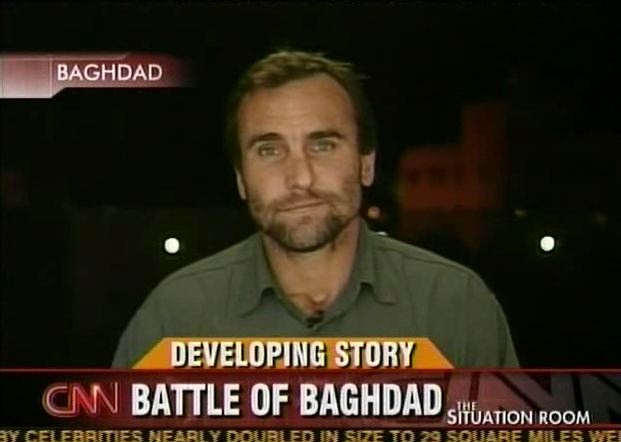TSR: ...and a friendly death threat.

Click photo to play
Length: 5:21
WOLF BLITZER: In Baghdad today a suicide truck bomber hit a U.S. Army outpost killing two American soldiers and wounding more than two dozen. One soldier died at the scene. The other died at a U.S. combat hospital. CNN was there. We have this exclusive video.
Two other American troops died in Iraq today, but for the Iraqis the toll much, much higher. Baghdad has been especially hard-hit. More than 100 bodies were turned up in the past three days, apparent victims of sectarian death squads. The U.S. military is hitting back.
And joining us now from Baghdad is Michael Ware, our correspondent. Michael, you just got off an embed. Where did you go this time? What did you see?
MICHAEL WARE, CNN CORRESPONDENT: Well, Wolf, this was quite interesting. This is -- we're seeing the Battle of Baghdad stepping up to a new level. This is the ongoing, massive military operation called Operation Together Forward designed to reclaim the capital from death squads, insurgents and militias.
What we saw today was thousands of U.S. troops hit for the first time a stronghold of the rebel anti-American cleric Muqtada al-Sadr. This is an area that it is known that death squads are running from. What we have seen in the past is Americans moving into areas where the death squads have been hitting. This time, they went to death squads' home patch for the first time.
BLITZER: Muqtada al-Sadr, though, this radical Shiite cleric, he's close to many within the Iraqi government of Nouri al-Maliki. What do they say, the Iraqi government, about the U.S. going after this militia?
WARE: This is a very complicated issue here, Wolf. I mean, the new prime minister is essentially a man with very little power. He has no popular votes, and the political currency in Iraq is weapons. The power of politics still comes at the barrel of a gun, so this is a prime minister, a man without a militia.
Now, he does have some backing from Muqtada al-Sadr, and his enormous Jaish al-Mahdi militia. So there's a very complicated relationship there. So as the Americans move against one of Muqtada's strongholds, there's a number of very interesting issues.
For a start, I was told by a U.S. officer that the prime minister had to sign off on this operation. Also, the Americans had to use Iraqi security forces, army, police and the controversial Ministry of Interior forces, though they weren't alerted until late in the piece, shortly before the raid. As one American commander told me, the militias knew we were coming.
BLITZER: Michael, I just heard you say that there's fear that there could be moles in Iraqi government that could give a tipoff to this Shiite militia that potentially could endanger the thousands of U.S. troops you were with?
WARE: Well, this is very much an ongoing issue. I mean, it's been raised many, many times by U.S. military intelligence and at the highest levels of the embassy here in Baghdad, this close connection between large chunks -- in fact, key elements -- of this government, with not only these militias but their Iranian backers.
So very much this was a factor that was working to the planning for this mission, for this new phase of the Battle of Baghdad. The American officers said that clearly leakage of information was a part of the issues involved. So very much we see that that is at the forefront here -- Wolf.
BLITZER: I know you got close to what's called Sadr City, the slum part of the Iraqi capital, a huge area, mostly Shiite. How bloody was this battle for the U.S. troops that you just eyewitnessed?
WARE: Well, what happened today was very much -- was very interesting. I mean, this is the first phase of an operation into this district that we'll see continue to see roll on in days to come. But by and large, it was a passive operation. I mean, the people were there, ready, waiting, kind of welcoming but kind of not.
I mean, for a start, we had a sniper attack that wounded a U.S. soldier. I believe that he was only lightly wounded. There was also an IED or roadside bomb attack on a Stryker armored vehicle. And also, when I was talking to some of the locals there, they pointed to the American soldiers and they pointed to me as a journalist and said, "Jaish al-Mahdi" -- Muqtada's militia -- like this.
When I asked them where is Muqtada's militia, they said, oh, they're off having breakfast. So that's the kind of place this was. So even though it was quiet on the surface, that doesn't necessarily mean anything.
By and large, what intelligence sources believe is happened is that these guys know that the Americans are coming. They move out and let the operation wash over. Then they return once the control is given back to the Iraqi police, Wolf.
BLITZER: This battle for Baghdad is going to be fierce as a lot of U.S. military leaders have suggested. As goes Baghdad, the Iraqi capital, so goes the Iraqi nation. Michael Ware on the scene for us, doing some very courageous reporting. Thank you.
